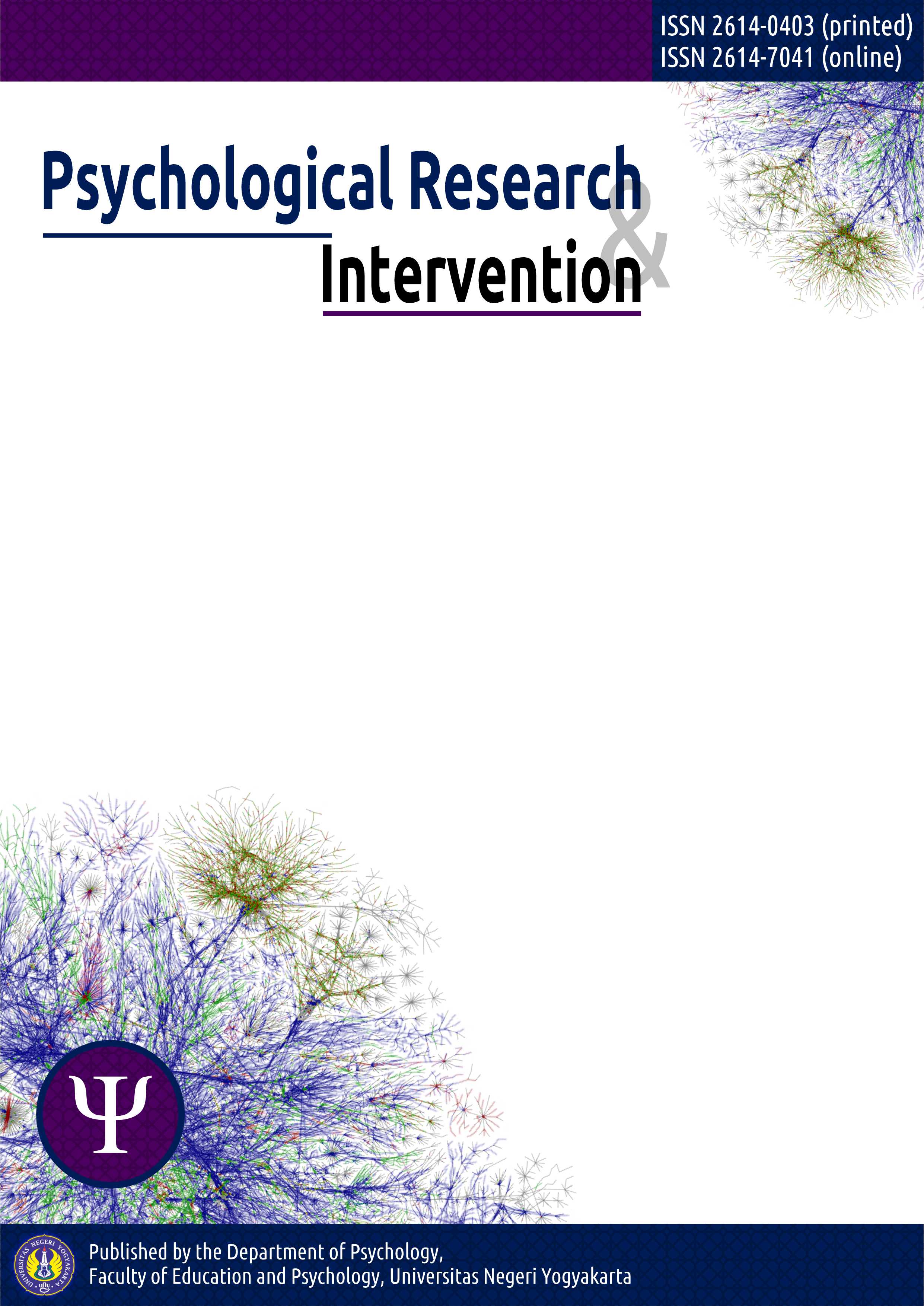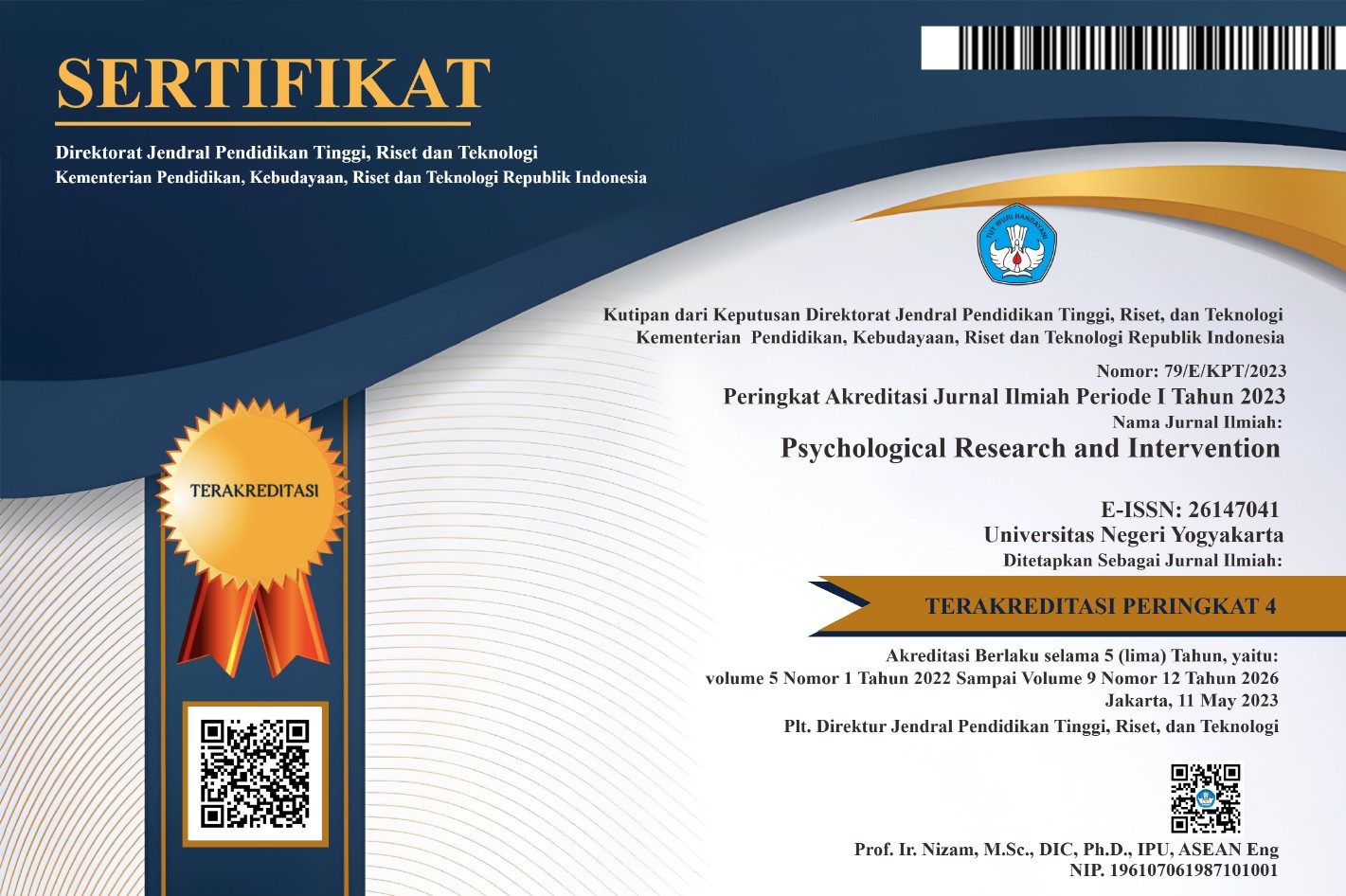The effect of big five personality on student engagement in high school student at Yogyakarta
DOI:
https://doi.org/10.21831/pri.v5i2.52568Keywords:
Student engagement, Big Five, StudentAbstract
The low level of student engagement happened when the pandemic COVID-
19 with dynamic learning system changes. The changes in the learning system from distance learning, and restricted face-to-face learning, to complete face-to-face learning, made student must be adaptive. A student's ability to maintain student engagement can't be taken off from the student's personality. Therefore, this study aims to determine the effect of Big Five Personality on student engagement in high school students in Yogyakarta. This study used a quantitative approach with ex post facto type. Participants involved in this study as many as 349 students from high schools located in Yogyakarta. This study's instruments were the student engagement scale and Big Five Inventory. The data analysis technique used multiple linear regression. The results of this study showed that there was a positive influence of Big Five Personality on student engagement with Sig. 0.000 (p<0.05) and the effective contribution is 27,2%. Personality traits that specifically influence student engagement are agreeableness (Sig.=0.045), conscientiousness (Sig.=0.00), and openness (Sig.=0.006). Every personality trait had an effective contribution with extraversion as much as 4,35%, agreeableness as much as -0,02%, conscientiousness as much as 16,96%, neuroticism as much as 0,2%, dan openness as much as 5,73%.
References
Arifani, A. D. (2018). Peer Attachment dan Student Engagement pada Siswa SMA [Universitas Islam Indonesia]. https://dspace.uii.ac.id/handle/123456789/6763
Christenson, S. L., Wylie, C., & Reschly, A. L. (2012). Handbook of Research on Student Engagement. Handbook of Research on Student Engagement, 1–840. https://doi.org/10.1007/978-1-4614-2018-7
Feist, J., & Feist, G. J. (2008). Theories of Personality (Seventh). Mc Graw Hill. http://www.primisonline.com
Fredricks, J. A., & McColskey, W. (2012). The measurement of student engagement: A comparative analysis of various methods and student self-report instruments. In Handbook of Research on Student Engagement (pp. 763–782). Springer US. https://doi.org/10.1007/978-1-4614-2018-7_37
John, O. P., & Srivastava, S. (1999). The Big-Five Trait Taxonomy: History, Measurement, and Theoretical Perspectives.
Komarraju, M., Karau, S. J., Schmeck, R. R., & Avdic, A. (2011). The Big Five personality traits, learning styles, and academic achievement. Personality and Individual Differences, 51(4), 472–477. https://doi.org/10.1016/J.PAID.2011.04.019
Mahama, I., Dramanu, B. Y., Eshun, P., Nandzo, A., Baidoo-Anu, D., & Amponsah, M. A. (2022). Personality Traits as Predictors of Self-Regulated Learning and Academic Engagement among College Students in Ghana: A Dimensional Multivariate Approach. Education Research International, 2022. https://doi.org/10.1155/2022/2255533
McAdams, D. P. (2009). The Person : An Introduction to The Science of Personality Psychology. Wiley.
Moreira, P. A. S., Inman, R. A., Cloninger, K., & Cloninger, C. R. (2020). Student engagement with school and personality: a biopsychosocial and person-centred approach. British Journal of Educational Psychology, 91(2), 691–713. https://doi.org/10.1111/bjep.12388
Pamungkas, T. A. P. (2019). Pengaruh Motivasi Berprestasi Terhadap Student Engagement Mahasiswa BK UNY.
Qureshi, A., Wall, H., Humphries, J., & Bahrami Balani, A. (2016). Can personality traits modulate student engagement with learning and their attitude to employability? Learning and Individual Differences, 51, 349–358. https://doi.org/10.1016/j.lindif.2016.08.026
Ryckman, R. M. (2008). Theories of personality. Thomson/Wadsworth.
Santrock, J. W. (2011). Life-Span Development (13th ed.). McGraw-Hill.
Skinner, E. A., Kindermann, T. A., & Furrer, C. J. (2009). A Motivational Perspective on Engagement and Disaffection. Educational and Psychological Measurement, 69(3), 493–525. https://doi.org/10.1177/0013164408323233
The Quality Indicators for Learning and Teaching. (2021). 2020 International Student Experience Survey. www.qilt.edu.au.
Zeidner, M. (2009). Personality in Educational Psychology. In P. J. Corr & G. Matthews (Eds.), The Cambridge Handbook of Personality Psychology. Cambridge University Press.
Zhang, X., Chen, G., & Xu, B. (2020). The influence of group big-five personality composition on student engagement in online discussion. International Journal of Information and Education Technology, 10(10). https://doi.org/10.18178/ijiet.2020.10.10.1452












